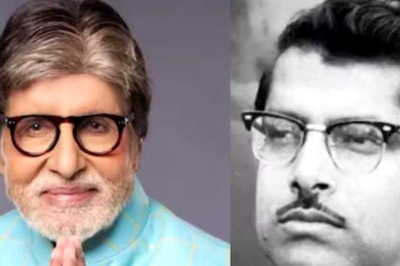
views
New Delhi: As the nation mourns the demise of former prime minister Atal Bihari Vajpayee, one man who was close to the statesman is lost in his books. NM Ghatate, a regular visitor at Vajpayee home for the last four years, did not attend the state funeral accorded to the former PM at Smriti Sthal on Friday.
“There were close to five lakh people there. I would have been lost,” says the octogenarian. “Well, he (Vajpayee) would not have met this fate if he had agreed for the CT scan, but refused to enter into ‘that dabba’ (CT scan machine),” he says with affectionate authority only someone close to Vajpayee can.
A long-time friend, Ghatate is coping with the loss by immersing himself into his literary works on Vajpayee. Sitting in his Hailey Road residence, Ghatade remembers that it was just after the Agra Summit that Vajpayee had visited Lahore.
“Both Nawaz Sharif and Benazir Bhutto always said that India’s relations with Pakistan was at its best when Atal ji was the foreign minister. In fact, Nawaz Sharif had told Atal ji that he could win from any constituency in Pakistan,” says Ghatate.
He says that anytime he visited Pakistan, he would always be asked about Atal Bihari Vajpayee and his wellbeing. “When the Janata government was in power, Atal ji said to me that ‘if I had five years, I would have transformed and normalised relations with China and Pakistan’,” recalls Ghatate.
Ghatate first met Vajpayee in 1957 and got a regular pass made to attend all of Vajpayee’s speeches. “I never missed any of his speeches. Though I was 13 years his junior, he treated me as a confidant and friend.”
The two were so close that Morarji Desai had once called Ghatate Vajpayee’s ‘follower’ when the latter stayed at Ghatate’s Washington apartment for a day while visiting the US to witness the 1960 presidential elections.
With the recent spike in incidents of attacks on minorities and Dalits, would have Vajpayee handled the issue differently than Prime Minister Narendra Modi? Though Ghatate believes “times have changed” and “nothing can be said”, the former vice-chairman of the Law Commission says the lines of religion often became prominent whenever there were conflicts or riots.
“He (Vajpayee) once told me that on the one hand we say Hindus and Muslims are equal. But when riots take place, you count how many Muslims were killed and how many Hindus were killed. Jo bhi marta hai woh Bharatiya hota hain (whoever dies is an Indian),” said Ghatate.
One thing that reaffirmed Ghatate’s impression of Vajpayee being the most humble and yet firm man, it was Vajpayee’s interaction with then Pakistan military ruler Pervez Musharraf right after the Kargil war.
“After Kargil, Vajpayee had even extended a hand of friendship to Musharraf. He also told Musharraf ‘please take care of your health’. It was just after that that an assassination attempt was made on Musharraf,” Ghatate said.
Senior Advocate Ghatate, who now handles few select cases in the Supreme Court, recollects that it was he who drafted the Armed Forces Appellate Tribunal Bill at the insistence of Vajpayee and that “Atal ji was the man who brought in several constitutional amendment bills”.
“He wanted the death penalty to be implemented in a more humane manner and hence moved a constitutional amendment bill, but it did not see the light of the day. He had prepared innumerable bills. After the IC Golaknath case, he moved an amendment bill post the verdict. Then law minister HR Bhardwaj asked him to withdraw the death penalty bill, but he refused. Vajpayee also moved a bill for reservation for the blind,” says Ghatate, who has also edited a book that deals specifically with the bills brought in by Vajpayee.
But one thing that distinguished Vajpayee from the other parliamentarians was that he never jumped into the Well of the House, says Ghatate. “He strongly believed that Parliament must always go on. Rather than taking part in the protests, he said politicians enjoyed disruptions as it allowed them to evade the crucial Question Hour,” says Ghatate, who spent a marathon 200 hours with Vajpayee at his residence editing and proof-reading a 2,000-page book on Vajpayee’s life as a parliamentarian. The work has has been published in four volumes.
The biggest political setback Vajpayee suffered was losing the no-confidence motion by one vote. Recollecting an episode from that evening, Ghatate remembers Vajpayee’s personal secretary chalking down a plan to vacate the 7, Race Course Road Bungalow.
“The personal secretary was telling Atal ji that he would soon find out the protocol for leaving the Race Course Road residence. But Atal ji said ‘what is the need for protocol? Just pack your bags and leave!’” says Ghatate.
But did Vajpayee ever want to return to active politics? Ghatade replies with a hard no.
“After demitting office, he spoke to me. Atal ji told me ‘I have served the country for 50 years and now I want to retire’. When Manmohan Singh, after signing the nuclear deal in 2008, went to Vajpayee, he said, ‘I have completed the work you started’. Atal ji kept quiet. Manmohan said ‘Bhishmapitamah, now say something’, but Vajpayee kept quiet,” says Ghatate.
If there was one thing Ghatate thought could cause trouble to his friend, it was Vajpayee’s association with him. The first signs were visible when he was asked to resign as Vice-Chairman of the Law Commission, then headed by Justice M Jagannadha Rao.
“When I resigned from the Law Commission as vice-chairman, Atal ji told me should I talk to then law minister Bharadwaj. I told him not to involve in such petty matters. But he always told me ‘jahan pe tumhara naam aata hain, mera naam bhi kheecha jaata hai (my name is dragged along with yours),” Ghatate says, his eyes welling up with tears.
















Comments
0 comment